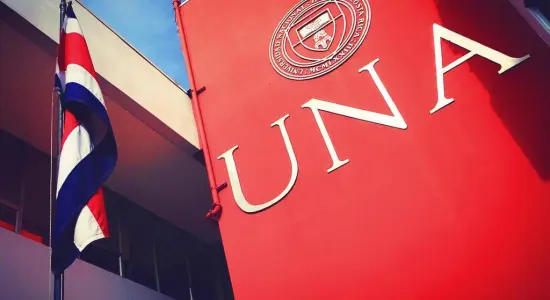Artificial Intelligence (AI) as an enabler of futures poses crucial challenges in the ambit of research and the formation of professionals. In an ever-changing world, universities are gearing up to prepare future generations for jobs and leadership roles that do not yet exist.
Internationally, AI is having an impact in ambits such as health and agriculture. “We know that it is used in diagnostics using image analysis to identify patterns and characteristics that may be indicative of disease. In agriculture, it is used to optimise crops or identify plant diseases, which can have a positive impact on improving agricultural production and therefore food security,” said Jorge Herrera, vice-rector of research at the National University (UNA).
AI will play a crucial role in future university research by revolutionising the way knowledge is generated, analysed and applied.
AI can significantly speed up the search and analysis of data, allowing researchers to process large sets of information in a matter of minutes or even seconds. This will not only increase the efficiency of research, but also facilitate the discovery of hidden patterns and relationships in complex data, leading to faster scientific breakthroughs.
“Fifty years ago, our biggest challenge was to locate earthquakes, there were few plant stations to do so, now the location has become trivial and we know that they are located on the plate margins, this allows us to know the dimensions and the most active areas of the planet. The development of a neural network to detect earthquakes, allows us to have 13.5 terabytes of data accumulated since 2010, which grows as the data grows AI allows us to analyse Big Data, and make predictions and/or accurate estimates about natural processes, with this amount of data we can export these databases and, with the application of technology, see models that we cannot see,” explained Esteban Chaves, a researcher at the National University’s Volcanological and Seismological Observatory (Ovsicori-UNA).
The analysis of data and prospective research and the construction of future scenarios that allow for the anticipation of different impacts, says Herrera, is already reflected in another area that presents great challenges such as climate change, “it is applied in the monitoring and prediction of climate change, the conservation of biodiversity and the sustainable management of natural resources”.
From university research, Herrera says AI is being used to improve efficiency, accuracy and innovation. “It is used to analyse large amounts of data, create models and automate tasks. In the natural sciences, new drugs, materials and renewable energy are being developed. In the social sciences, it is used to study human behaviour, economics and politics. In engineering, new products and systems are designed. It is a tool that is facilitating governmental and strategic decision-making in various ambits of life, organisations and companies.
Academia in sight
Another ambit that will have a big impact is education.” AI is bringing a wealth of tools that enable personalisation of teaching, potentially contributing to tailoring educational programmes and curricula more closely to the individual needs of learners. Increased availability of online resources, online education platforms that can offer more interactive and personalised learning experiences. Similarly, AI can make higher education more accessible by offering online learning options, which can democratise access to quality education,” said Herrera.
For Willy Castro, from the vice-rectorate for teaching, the use of AI presents great challenges for higher education. “We have to have an analysis of what technologies we really need, and this is not happening at the speed that is happening in the market.
For Castro, there is a need to transform what we do in academia. If AI takes over the more operational activities, we can focus more on research. “Will AI replace the teacher? No, but we need to transform what we do, and we probably still do not know what we should or should do.
Castro says that AI requires input from teachers, although innovation is not exclusive to teachers. “The processes of teacher transformation and training have to be integrated with managers, academics, administrators, IT specialists and students; we all have to be involved in this process for it to be effective.
For Chaves, including AI in university formation includes another challenge: What kind of skills do we want to develop in students: consumers or developers? In my opinion, fundamental blocks such as physics, mathematics and statistics must be strengthened, we cannot sell that AI will solve everything with the bases that others have made available to us, then we would only be consumers, we have to modernise ourselves and modernise our curricula to include programming and Big Data”.
Ethical challenges also pose a challenge, with global AI experts such as Sam Altman, Bill Gates and Elon Musk warning that AI systems are emerging at breakneck speed, and that humanity is in an urgency to quickly establish prudent regulatory mechanisms.
“In the future, AI will continue to be a fundamental tool for accelerating scientific progress, optimising resource management, addressing global problems and improving the quality of life. Interdisciplinary collaboration between academia, industry and government will be essential to maximise the potential of AI in the country’s research and development. Artificial intelligence has significant potential to boost university research and contribute to the country’s development in multiple areas. However, it is crucial to address ethical challenges and ensure responsible use of the technology to maximise its benefits,” Herrera said.
Thinking the future
On 11 and 12 October, the First National Congress on Futures Studies in Costa Rica will take place from 8 a.m. in the Cora Ferro auditorium of the National University. Organised by the Vice-Rectory of Research and the School of Planning and Social Promotion of the National University, its relevance lies in the growing importance of scientific and technological innovation, as well as the challenges of economic development and social and environmental wellbeing, which go beyond short-term planning and control, to planning that questions the future.
Communication Office of the Universidad Nacional, Costa Rica






